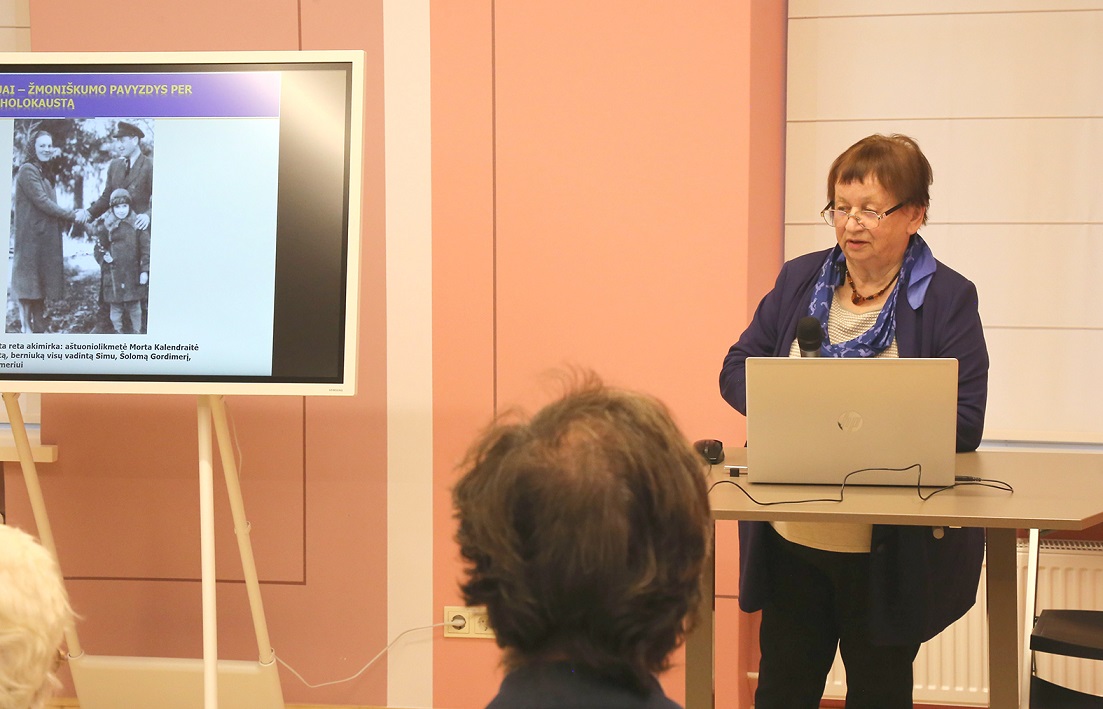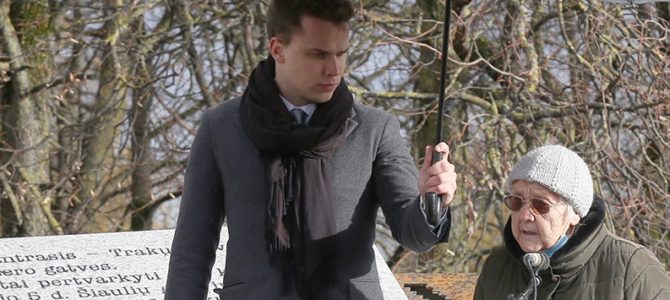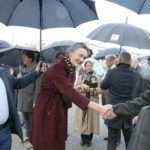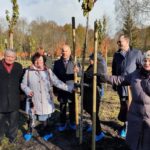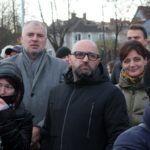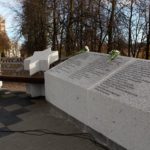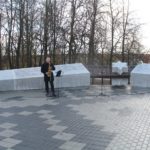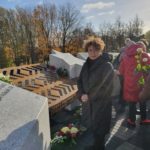Photo: Righteous Gentile Genovaitė Černiauskaitė-Dugnienė expresses gratitude in name of Righteous Gentiles.
Righteous Gentile Square at the intersection of Vilniaus and Ežero sttreets at the former ghetto gates in the Lithuanian city of Šiauliai was opened ceremoniously and consecrated last week. The renamed square will showcase the names of people from the city and district of Šiauliai who rescued Jews during the Holocaust. The city of Šiauliai thus becomes the first municipality in Lithuania to honor Righteous Gentiles with a monument. The new park is the fruit of the Jungtis [Connection] project by Šiauliai-resident designer Adas Toleikis and includes artistic allusions to the former ghetto.
“You can’t buy love or tolerance for money, you have to grow it in your heart,” Righteous Gentile Genovaitė Černiauskaitė-Dugnienė said.
Participating at the opening ceremony were Lithuanian Jewish Community chairwoman Faina Kukliansky, members of the Šiauliai Jewish Community, Righteous Gentiles and their descendants, speaker of parliament Viktorija Čmilytė-Nielsen, other Lithuanian MPs, Lithuanian military commander lieutenant general Valdemaras Rupšys, Lithuanian soldiers and priests, ambassadors from Israel, the USA, Japan and Germany and NATO forces integration commander in Lithuania colonel Peter Nielsen.
Righteous Gentile Genovaitė Černiauskaitė-Dugnienė travelled from Mažeikiai, Lithuania, to attend the ceremony and spoke last.
The ceremony began with a musical performance by Gediminas Brūzga of works from the film Schindler’s List. A moment of silence to honor those Righteous Gentiles who have passed away followed.
Šiauliai mayor Artūras Visockas then spoke, expressing the wish for people find “balance, so that formal life becomes more tolerant, as much as possible, or that it becomes more understandable through the philosophic prism of the heart.” Mayor Visockas gave thanks to the creator of the monument, designer Adas Toleikis, and also thanked architect Ilona Voznonienė.
A special keepsake was manufactured for the occasion. The mayor presented it to Toleikis, and later to those who spoke at the ceremony.
Parliamentary speaker Čmilytė-Nielsen said: “I’ll admit that this is the place of my earliest childhood memories. Back then it was a kind of transit zone, in a certain sense a forgotten land where people sought not to stay long.” She pointed to a nearby apartment block where she had lived until the age of four, and High School No. 10 where he mother taught history.
Čmilytė-Nielsen told the story of the Zubov family, whose scion the architect Vladimir Zubov and wife Danutė Čiurlionytė-Zubovienė and mother-in-law Sofija Kymantaite-Čiurlionienė rescued Jews from the Kaunas ghetto. He was awarded the title of Righteous Gentile in 1991. “As Vladimir Zubov said, by saving Jews, he was saving the dignity of the Lithuanian people. Citizens of Lithuania, the Righteous among the Nations rescued for us the opportunity to live in dignity, so let’s make use of that opportunity. And this location, this wonderful square, I believe, will become for us a reminder every time when doubt arises and there is a choice between comfortable silence and being humane.”
Israeli ambassador to Lithuania Yossef Avni-Levy called this event one of the most impressive and sensitive he has attended in his diplomatic career. He said memory as well as people were meeting at this historical location.
Speaking about the Holocaust, the ambassador said it must not have been easy to decide to help innocent people, Jews, during this darkest period of history, all the more so since the rescuers and their families faced death for doing so. The ambassador asked rhetorically what we would do if someone knocked at the door in the middle of the night seeking help because they would be shot several hours hence, knowing we risked death for ourselves and our families if we did help. The Israeli ambassador said the people who did rescue Jews opened their doors and their hearts without regard to the law and the advice of others because they were good Christians, good Lithuanians and heroes, but foremost they were good people. He thanked these heroes in the name of the state of Israel.
German ambassador to Lithuania Matthias Sonn said: “I stand today before your as the ambassador of the country which, eighty years ago, in 1941, caused incalculable pain and suffering. We all know it is impossible to erase the atrocities committed or to bring back those who were murdered, but it is possible to learn from all of this and to remember.” He said the historical responsibility for this tragic period falls upon Germany now and forever.
American ambassador to Lithuania Robert Gilchrist spoke about Holocaust perpetrators as well as the brave acts of the Righteous Gentiles. He said Lithuania’s Righteous Gentiles pose a counterweight to the commemoration of Lithuanian Nazi collaborators. Ambassador Gilchrist named Jonas Noreika as one of those collaborators.
“No nation can pay their respects to Holocaust perpetrators while at the same time maintaining the democratic values which bind the USA and Lithuania,” he said, continuing with the wish this municipal square would remind us of those who courageously followed the dictate of their convictions and saved lives, and that the square might provide the strength to go forward and accept the real history of Lithuania.
Lithuanian Jewish Community chairwoman Faina Kukliansky said: “This square is marked by the reflection of light and hope in the black night of history. It is crucial when we talk of Righteous Gentiles not to ignore the fact that they were rescuers of the people of Lithuania, of Jews who were born and raised in Lithuania, who created Lithuania and our shared culture. We must not forget this, we must no succumb to artificial divisions. We must talk to future generations about the crimes and mistakes of the past and we must teach the right choices for the future.”
Chairwoman Kukliansky said the names of the Righteous Gentiles recorded in stone should be seen as a symbol of honor paid to correct choices and conscience, and as memory of all the Holocaust victims who were not rescued.
“Today, around the world and in Lithuania as well, we see expressions of anti-Semitism flaring up again, for which there can be no justification or tacit tolerance. History values right actions, not shameful silence. Let us choose daily the light which the example set by the Righteous among the Nations radiates,” Kukliansky said. She also demonstrated a booklet published in Kaunas in 1927 with recommendations for tour guides; in the chapter on Šiauliai, the booklet recommended visiting the steam-powered mill located at Vilniaus street no. 154. This mill belonged to Kukliansky’s grandfather and her grandparents, her mother and their entire family lived there.
“My grandfather fled the ghetto together with my mother when she was 10 years old, but no one helped them. The white arm-banders caught them and my grandfather begged on his knees not to kill my mother. Our family wasn’t as fortunate as some, but some were fortunate. Thank you, rescuers.” Kukliansky thanked the Sondeckis family specifically for saving the life of Markas Petuchauskas, the author and drama critic who went on to contribute so much to Lithuanian culture.
Righteous Gentile Černiauskaitė-Dugnienė said it was a pity she was the only rescuer at the ceremony and expressed gratitude for the idea, the project and their implementation.
“The rescuers did, after all, sacrifice themselves and their families, they weren’t just good people, they were also very courageous. Since childhood I have lived surrounded by people of Jewish ethnicity and we maintained contact until 2019, as long as they were alive, twice every week I received telephone cals from Israel. The Jewish people are very dear to me because my life has taken place surrounded by love, we wrote one another love letters and called each other by telephone,” she recalled.
She called upon parents and teachers to raise children from an early age to be tolerant of those around them and of people of different ethnicities.
“I would like my small nation to be proud and worthy of respect,” Černiauskaitė-Dugnienė said.
Šiauliai bishop Eugenijus Bartulis blessed the monument and those assembled, reminding them there were 159 clerics on the list of rescuers. The bishop expressed the hope the memory enshrined in the work of art would also recall other brothers and sisters who sacrificed for the higher good.
Thirty Japanese cherry trees were planted in Dainai Park after the ceremony.
Names inscribed in the Book of Life
At the event held at the Venclauskis house Righteous Gentile Genovaitė Černiauskaitė-Dugnienė spoke first: “My life is coming to an end and one wishes people would raise the next generation to be tolerant, and this is more important than money. You can’t buy love or tolerance with money, you have to grow it in your heart,” she said. She recalled the rescued Jews were taken away from Šiauliai and that her father was a kind of contact for this. She said those who were rescued expressed gratitude to their Lithuanian rescuers their entire lives.
“Let’s be proud of the people of our nation, let’s respect one another. We still lack tolerance in Lithuania, we are unable to speak to one another. My life is coming to an end, and one wishes people would raise the next generation to be tolerant, and this is more important than money. You can’t buy love or tolerance with money, you have to grow it in your heart,” she said.
Signatory to the Act of the Restoration of Lithuanian Independence and Lithuanian MP Emanuelis Zingeris recalled the story of his mother who was an 18-year-old high school student in Kaunas with great emotion. He recalled how all her classmates turned their backs on her the day the Germans plastered the city with the announcement that Jews weren’t people.
He told the story of how their history teacher saw his former female students, now Kaunas ghetto prisoners, being marched through the streets in 1943, and called out: “Forgive me, girls!” Emanuelis Zingeris said: “Can you imagine? A person wearing a white armband beat right on the spot.”
MP Zingeris said that in honoring the Righteous Gentiles, the city of Šiauliai has become a beacon and a lighthouse amid the moral chaos.
“The Righteous among the Nations are probably the holiest and most enlightened people who could ever exist in the world. They saved that which is most dear, they saved lives. I have had the opportunity to meet many Righteous Gentiles and members of their families, and they are very enlightened, they are people of a different kind of thinking, their values are different, for them the person comes first. The least we can do is to inscribes these people’s names in stone, but I believe their names, the names of their families are inscribed in God’s book,” Šiauliai Regional Jewish Community chairman Sania Kerbelis said.
Chairman Kerbelis donated the Lithuanian Order of the Cross of the Life-Saver medal awarded to Vincas Jokubaitis to the Aušra Museum in Šiauliai and thanked Adas Toleikis in the name of the Community.
Vilna Gaon Jewish History Museum director Kamilė Rupeikaitė told of the long, careful and often invisible work that goes into awarding someone the title of Righteous Gentile. The Vilna Gaon Museum has exhibits and shows films educating the public about Lithuania’s Righteous Gentiles.
Danutė Selčinskaja is the director of the Commemoration of Rescuers of Jews project and presented a segment from a series of films about Righteous Gentiles in Lithuania. She also showed participants photographs of the people whose names are inscribed in stone in Šiauliai’s Righteous Gentile Square. She said people of very different social strata, believers, atheists and agnostics, became rescuers, and there was no one common denominator. Currently Lithuania has awarded 1,588 rescuers of Jews the Order of the Cross of the Life-Saver. Yad Vashem in Israel has awarded 919 Lithuanians the title of Righteous Gentile.
from Šiaulių kraštas www.skrastas.lt
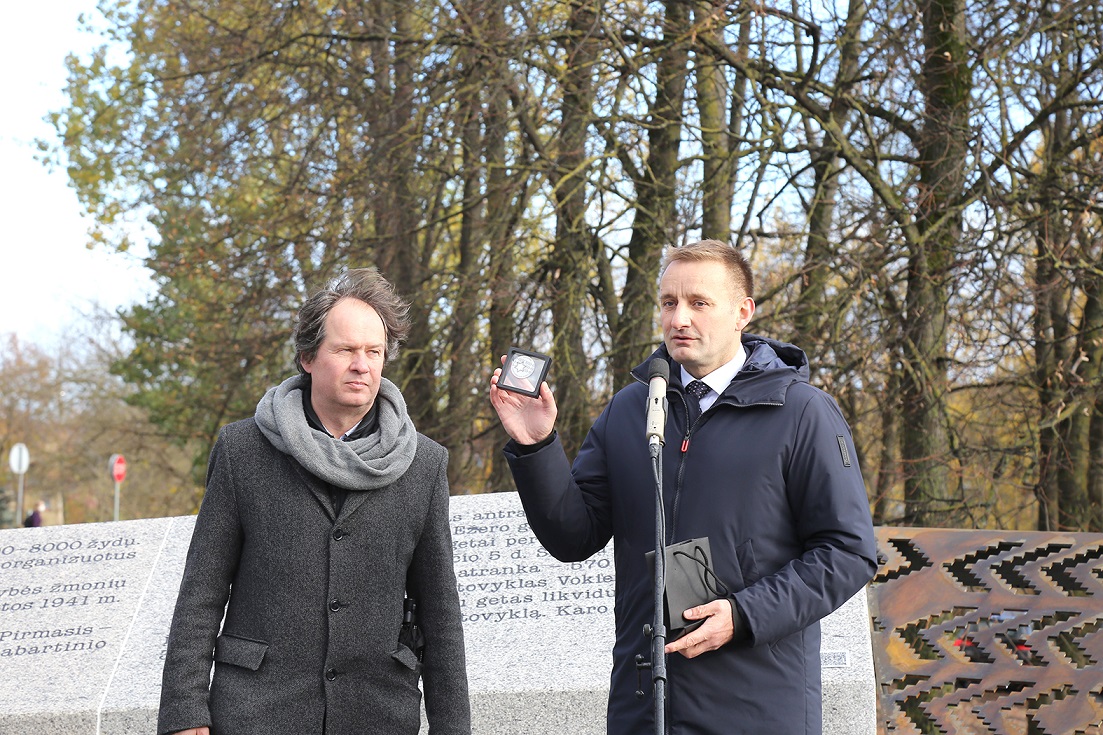
Photo: Šiauliai mayor Artūras Visockas (right) thanks Jungtis project creator Adas Toleikis and presents him with a keepsake. Photo by Artūras Staponkus.
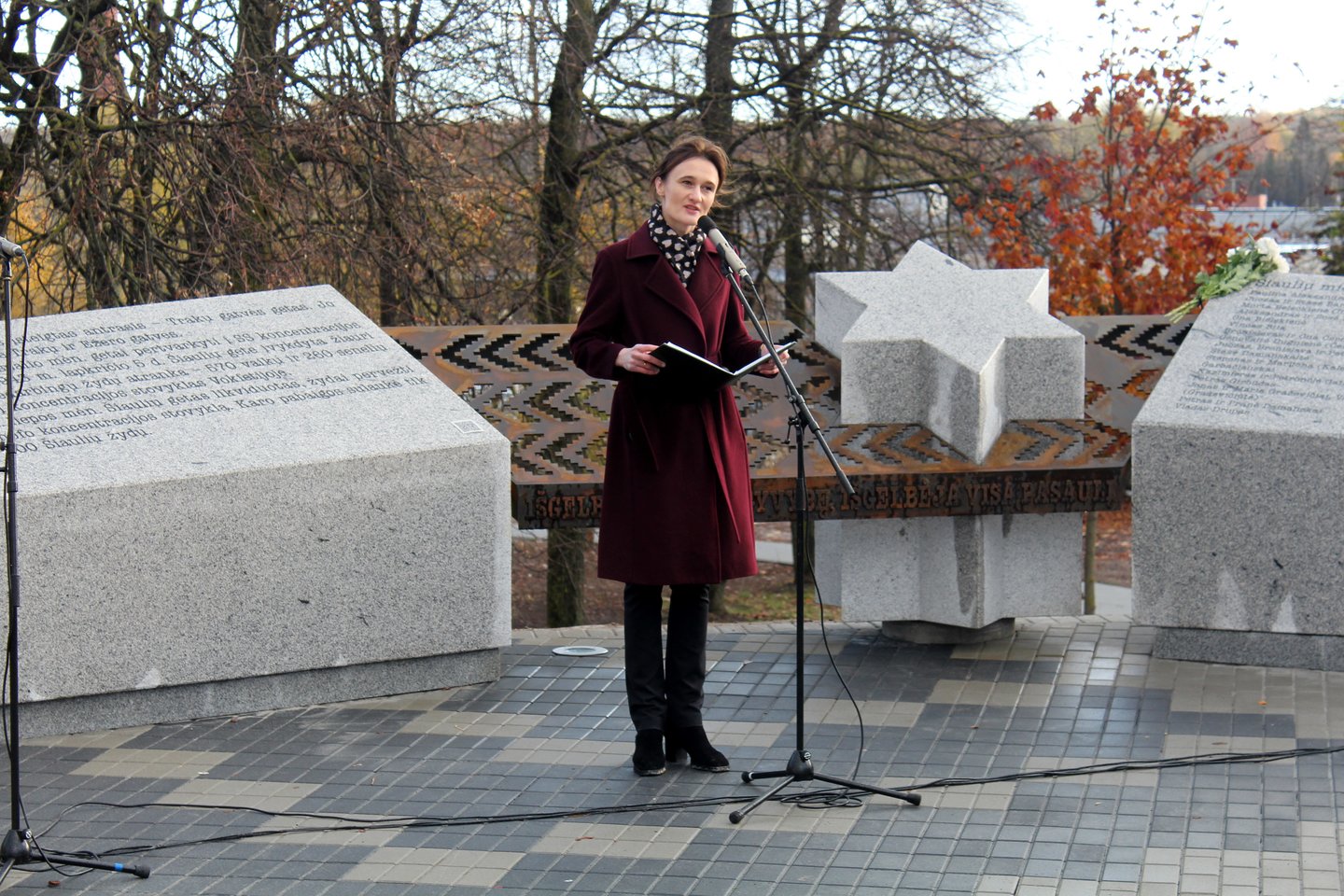
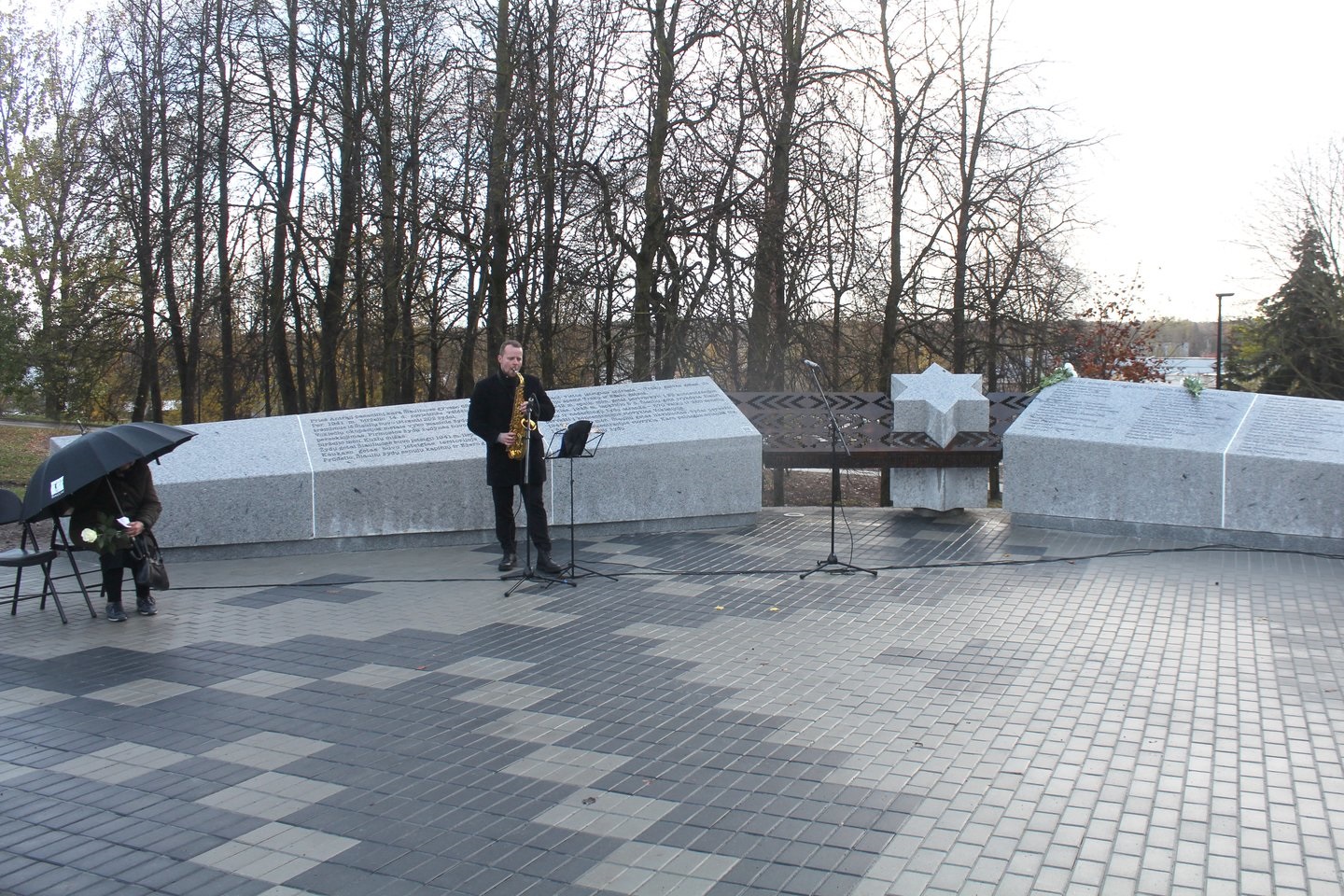
The ceremony began with a musical performance by Gediminas Brūzga of works from the film Schindler’s List.
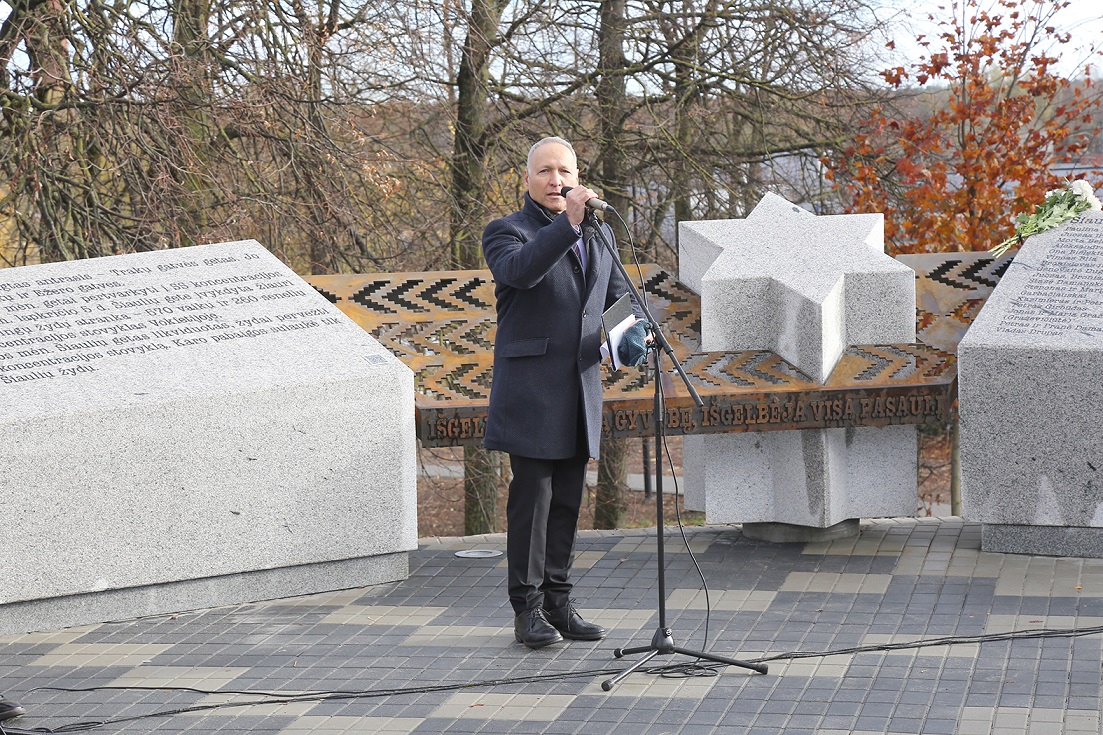
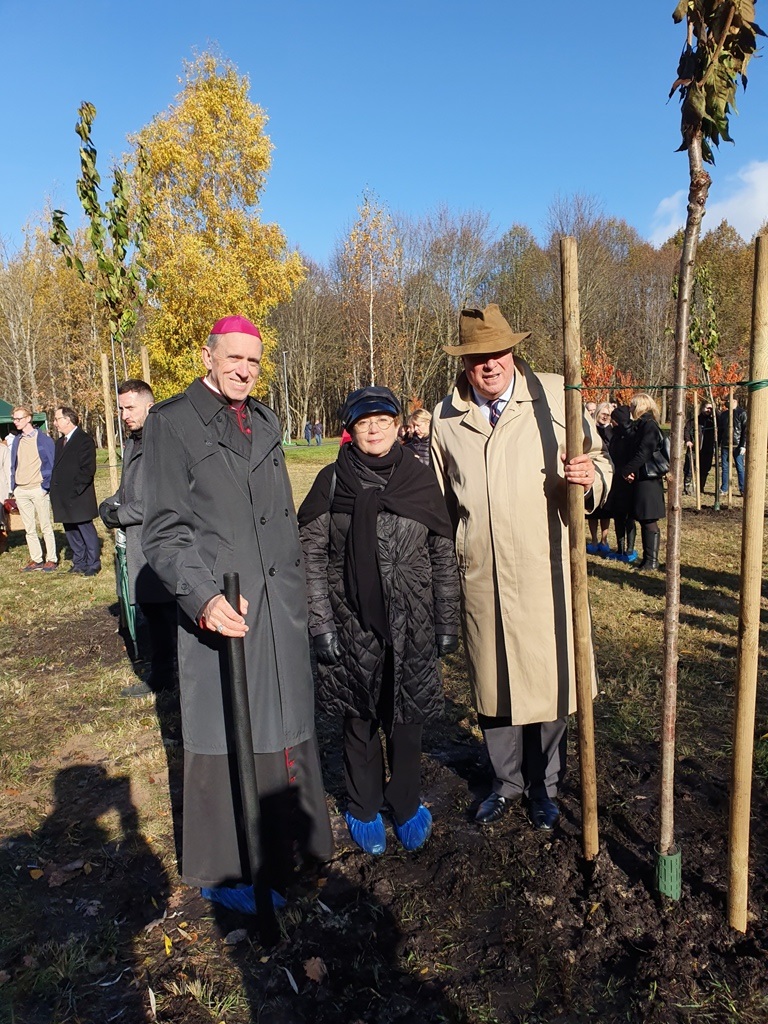
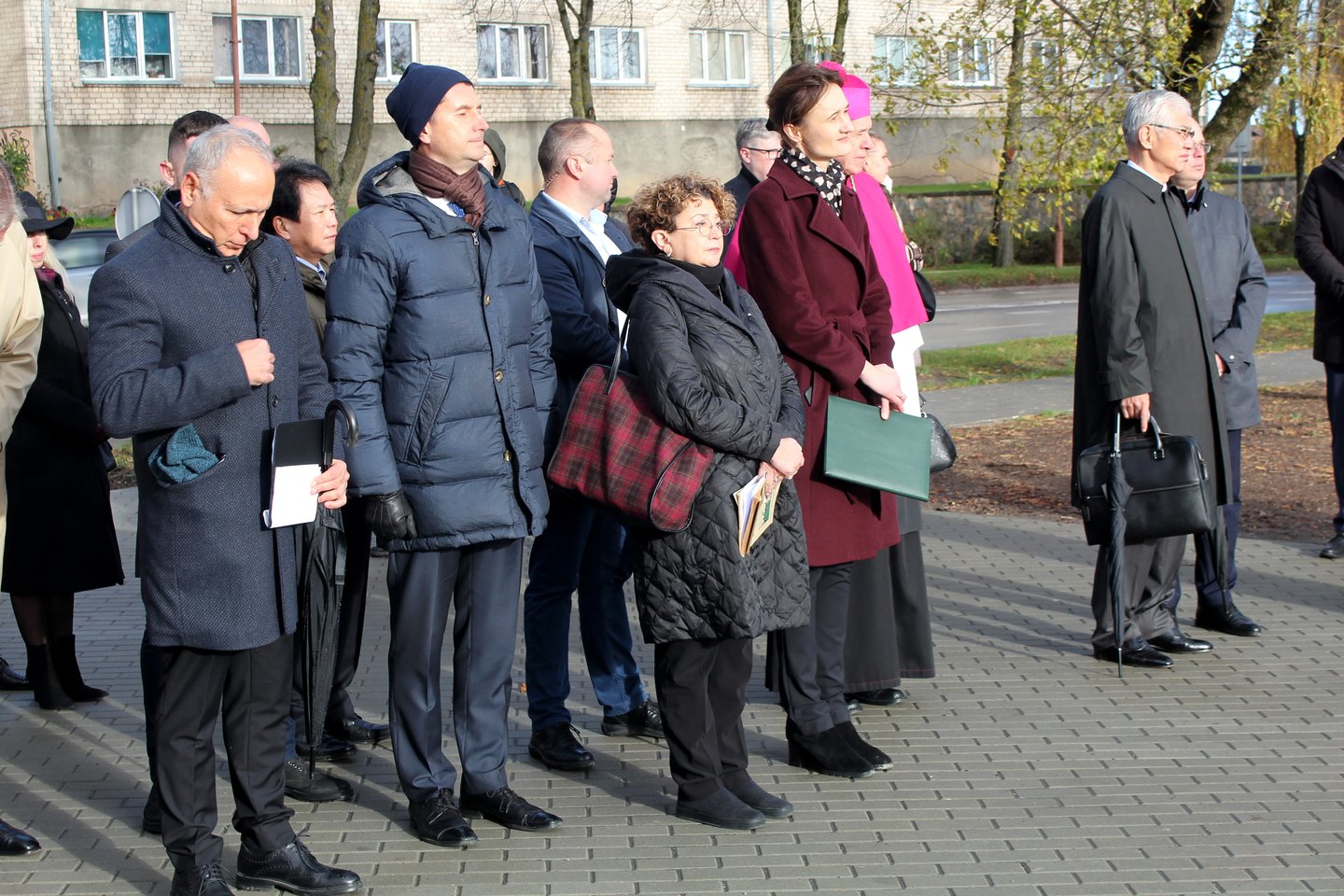
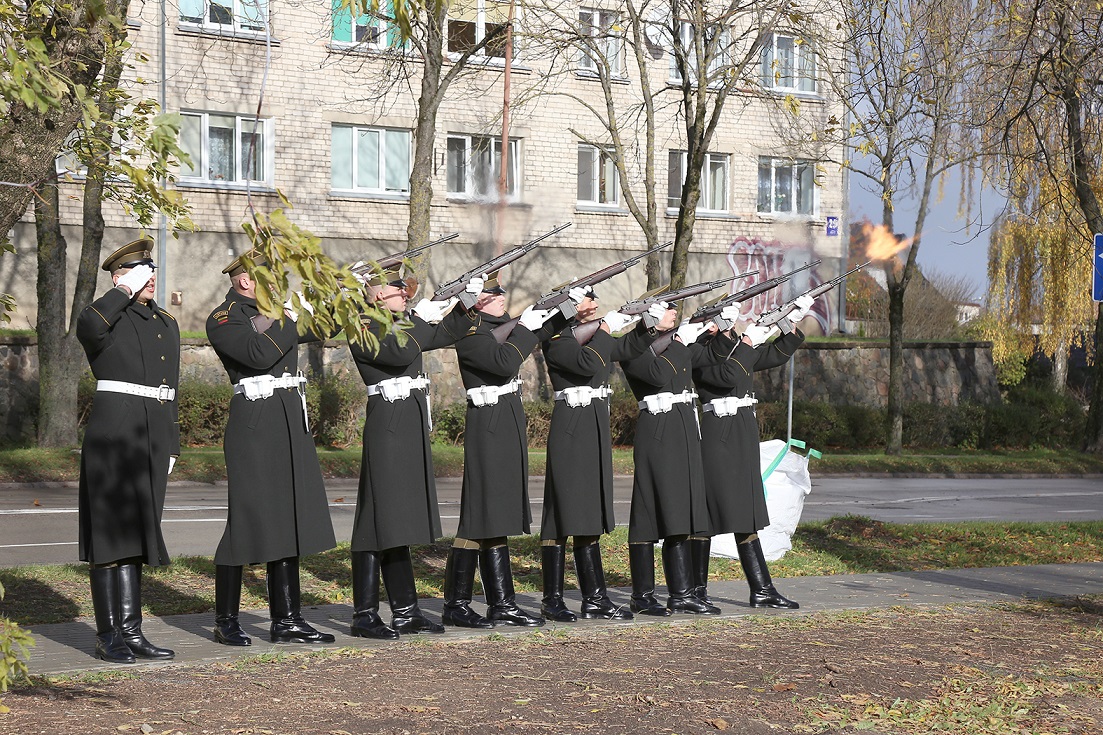
Photo: A symbolic flower was placed on the monument and a candle was lit there, with three volleys shot by soldiers from Lithuania’s honor guard. Artūras Staponkus.

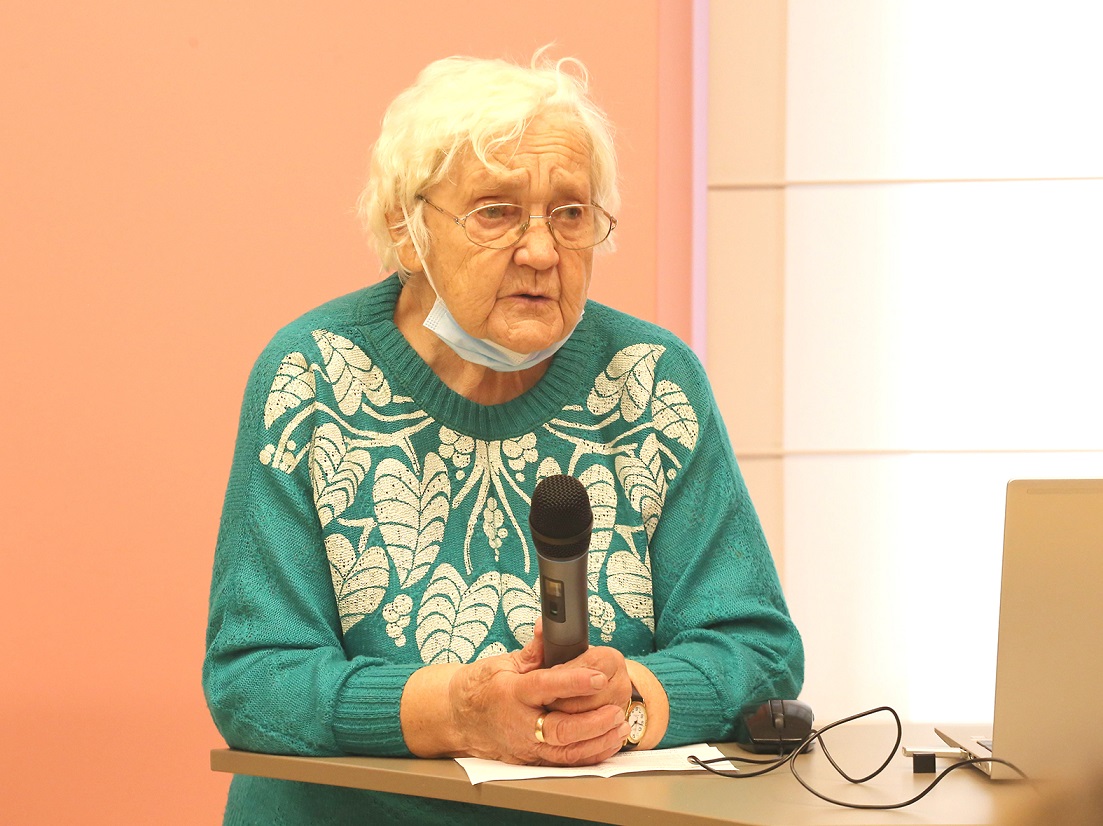
Photo: Righteous Gentile Genovaitė Černiauskaitė-Dugnienė spoke at the Venclauskis house. Photo by Artūras Staponkus.
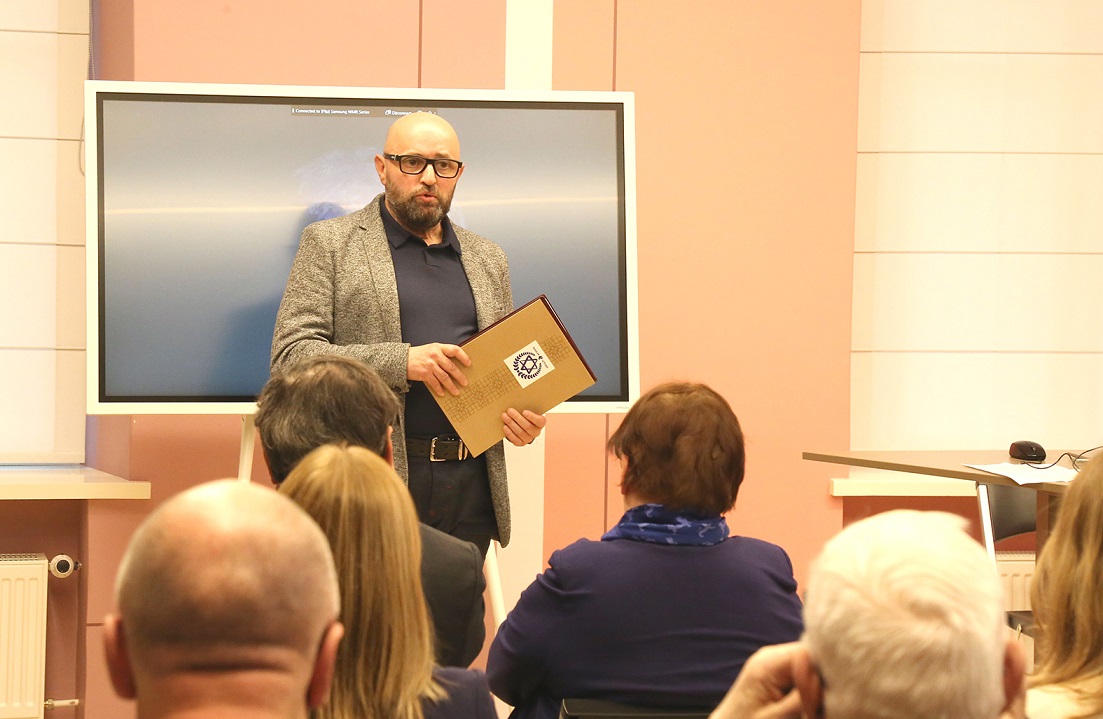
Photo: “The least we can do is to inscribes these people’s names in stone, but I believe their names, the names of their families are inscribed in God’s book,” Šiauliai Regional Jewish Community chairman Sania Kerbelis said. Šiauliai Regional Jewish Community chairman Sania Kerbelis contributed much to making the monument happen in Šiauliai. Artūras Staponkus.
